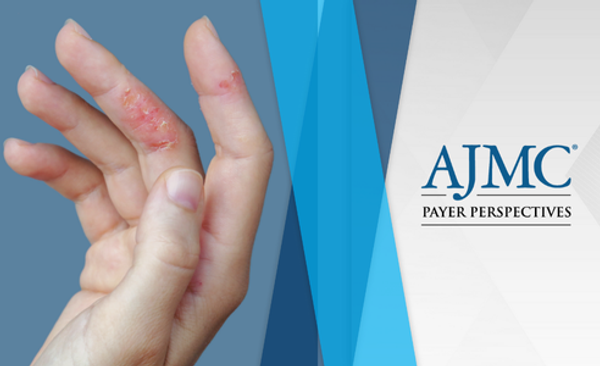
Atopic Dermatitis
Latest News

Latest Videos

More News

Atopic dermatitis (AD) in visible areas significantly impacts the romantic relationships, occupations, and sexual health of French female adult patients, according to a new study.

A US-based discrete choice experiment survey found that patients with atopic dermatitis (AD) prioritize treatments that effectively control itching.
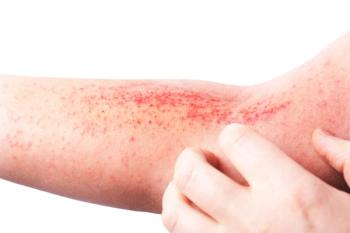
Educational interventions for patients, including both in-person and online methods, significantly reduced atopic dermatitis (AD) severity.

Patients with atopic dermatitis (AD) may have an increased risk of headache disorder and migraines.

A meta-analysis found significant associations between maternal stress, anxiety, depression, and adverse life events during pregnancy with increased atopic dermatitis (AD) risk in offspring.
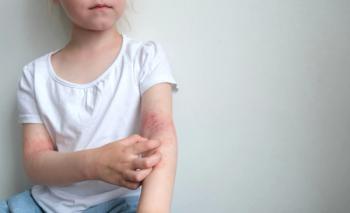
Children with atopic dermatitis (AD) face higher chances of learning and memory difficulties, particularly when they have neurodevelopmental comorbidities, like attention-deficit/hyperactivity disorder.

Amy S. Paller, MD, of Feinberg School of Medicine at Northwestern University, noted that safety is of paramount importance when choosing which systemic therapy to use to treat children with atopic dermatitis (AD).

Amy S. Paller, MD, chair of the department of dermatology at Feinberg School of Medicine at Northwestern University, discussed using systemic therapies to treat children with atopic dermatitis (AD).

A considerable number of patients with atopic dermatitis (AD) and limited health literacy, especially older individuals, experienced impaired health-related quality of life.

This study enhances current understandings of dupilumab use in patients with atopic dermatitis (AD) by showing its real-world effectiveness and safety.

Adult patients with moderate to severe atopic dermatitis (AD) had a 1-year and 1.5-year upadacitinib drug survival of 91.5% and 80.2%, respectively.

This systemic review determined telemedicine to be as effective as in-person appointments for the follow-up of patients with atopic dermatitis (AD).

Although injection site reactions were common occurrences in both the tralokinumab and dupilumab groups, tralokinumab caused ISRs more frequently.
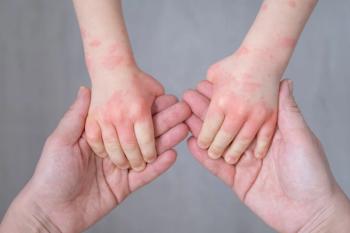
Dupilumab and topical corticosteroids can be used to treat symptoms in children with atopic dermatitis (AD).

Global warming, wildfires, precipitation, floods, and storms impact patients with atopic dermatitis (AD).

The researchers suggested that physicians consider age-relevant atopic dermatitis (AD) treatment preferences in discussions with patients and caregivers.

This study suggests that adolescents with atopic dermatitis (AD) sleep less, have greater sleep dissatisfaction, and longer weekend catch-up sleep (WCUS) than those without AD.

Elaine Siegfried, MD, of Saint Louis University School of Medicine, summarized the recent American Academy of Dermatology guideline update for atopic dermatitis (AD).

Jonathan Silverberg, MD, PhD, MPH, of George Washington University School of Medicine and Health Sciences, explains the benefits of using Janus kinase (JAK) inhibitors to treat patients with atopic dermatitis (AD).

Andy Blauvelt, MD, MBA, president of Oregon Medical Research Center, recommends new novel topical therapies over topical steroids for patients with atopic dermatitis (AD).

Elaine Siegfried, MD, of Saint Louis University School of Medicine, discusses how the recent guideline update by the American Academy of Dermatology (AAD) affects dermatologists' atopic dermatitis (AD) treatment decisions.

This year’s most-read articles on atopic dermatitis (AD) explored different treatment and education methods.

Exploring the Relationship Between AD, Psychological Stress, Sleep Disturbances, Salivary Biomarkers
Understanding these relationships is crucial for developing effective clinical management strategies for patients with AD, according to a recent literature review.
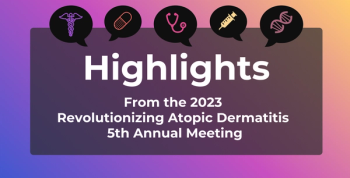
Our top coverage from this year’s Revolutionizing Atopic Dermatitis (RAD) conference highlighted the evolving therapy landscape for patients with AD.

Elaine Siegfried, MD, of Saint Louis University School of Medicine discusses the use of biologics to treat atopic dermatitis (AD) and how they differ from other treatments.




